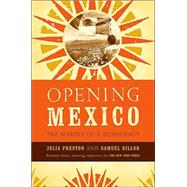
| Preface: Making Mexican Democracy | p. ix |
| The Day of the Change | p. 3 |
| From Disorder to Despotism | p. 31 |
| Tlatelolco, 1968 | p. 63 |
| Earthquake, 1985 | p. 95 |
| Chihuahua, 1986 | p. 117 |
| 1988 | p. 149 |
| The Carlos Salinas Show | p. 181 |
| 1994 | p. 229 |
| Ernesto Zedillo, the Outsider | p. 257 |
| Raul | p. 301 |
| The General and the Drug Lord | p. 323 |
| Testing Change, 1997 | p. 353 |
| The Earcutter | p. 385 |
| Opening Minds | p. 405 |
| Chiapas | p. 441 |
| Democracy at Work | p. 461 |
| Campaign for Change | p. 477 |
| Epilogue | p. 503 |
| Notes | p. 519 |
| Acknowledgments | p. 571 |
| Index | p. 595 |
| Table of Contents provided by Ingram. All Rights Reserved. |
The New copy of this book will include any supplemental materials advertised. Please check the title of the book to determine if it should include any access cards, study guides, lab manuals, CDs, etc.
The Used, Rental and eBook copies of this book are not guaranteed to include any supplemental materials. Typically, only the book itself is included. This is true even if the title states it includes any access cards, study guides, lab manuals, CDs, etc.
Excerpted from Opening Mexico: The Making of a Democracy by Julia Preston, Samuel Dillon
All rights reserved by the original copyright owners. Excerpts are provided for display purposes only and may not be reproduced, reprinted or distributed without the written permission of the publisher.